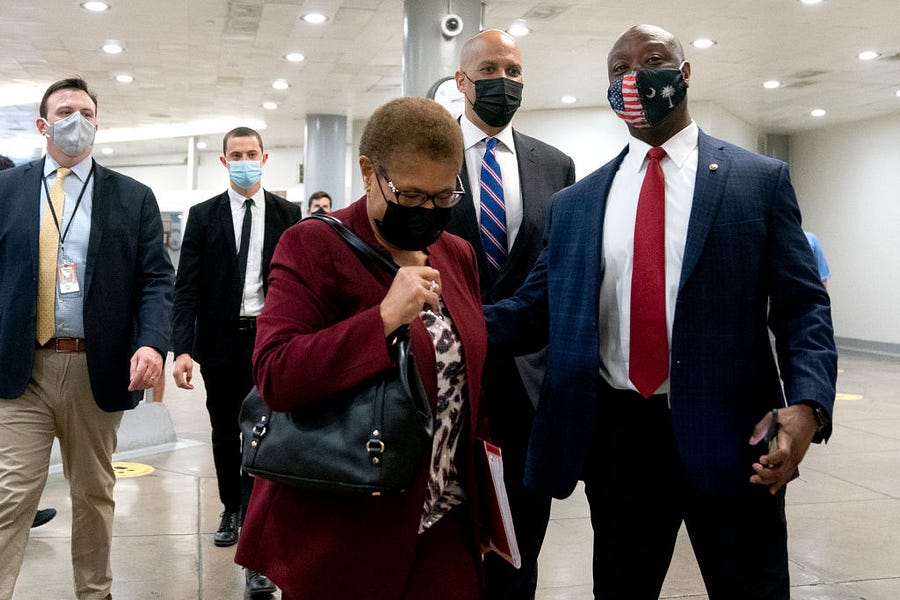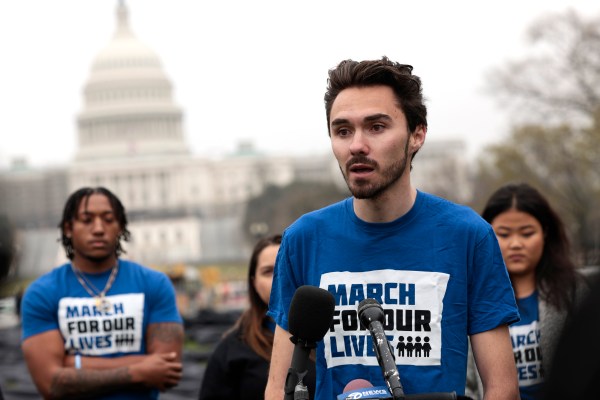Good morning. Congress is back from recess this week, and lawmakers have a lot on their plates.
Police Reform
Talks are continuing this week in hope of reaching a bipartisan police reform package.
House Majority Whip Jim Clyburn made a significant move toward compromise over the weekend, saying on CNN Sunday that Democrats should be willing to accept a deal even if it does not include an end to qualified immunity, the legal doctrine that largely shields police officers from liability.
“I want to see good legislation, and I know that sometimes you have to compromise,” Clyburn, a South Carolina Democrat, said. “If you don’t get qualified immunity now, then we’ll come back and try to get it later, but I don’t want to see us throw out a good bill because we can’t get a perfect bill.”
Republicans have opposed the Democratic effort to end qualified immunity. GOP Sen. Tim Scott has called for provisions to make it easier to sue police departments and local governments as a whole rather than targeting individual police officers. While many Democrats have signaled they don’t see that as sufficient, Clyburn’s comments appeared more open to the possibility.
The Wall Street Journal reported details of the emerging compromise legislation over the weekend. The tentative deal would limit transfers of some military equipment to local police departments, ban the use of chokeholds except in life-threatening situations, and set federal standards for no-knock warrants. There are still key components unresolved, though, and bill language has not been finalized yet.
Lawmakers have eyed the end of May—the one-year anniversary of George Floyd’s murder—as their goal for reaching a deal.
Infrastructure
President Biden has several meetings with lawmakers scheduled for this week to determine the path forward for a bipartisan infrastructure package. He met yesterday with Sen. Tom Carper, the Delaware Democrat who chairs the Environmental and Public Works Committee, as well as West Virginia Sen. Joe Manchin, who has been involved in talks with Republicans for a potential agreement.
Biden has proposed $4 trillion in new spending for a range of priorities, including extending the expanded child tax credit and providing universal prekindergarten and tuition-free community college. Republicans oppose most of Biden’s plan, but they have expressed interest in working with the White House on some of its physical infrastructure components.
A group of Senate Republicans last month proposed $568 billion over five years for traditional infrastructure items, like roads, bridges, airports, and water systems. The plan would also direct billions to broadband, public transit, and rail. Democrats in Congress argued it is not generous enough, noting that the offer involves funding for the reauthorization of current programs instead of totally new spending. Proponents say the offer is only a starting point—and they are open to a larger final bill that could entail some climate and energy provisions as well.
Biden will meet tomorrow with congressional leaders, including House Speaker Nancy Pelosi, Senate Majority Leader Chuck Schumer, House GOP Leader Kevin McCarthy, and Senate GOP Leader Mitch McConnell. They’ll discuss a range of issues, and Biden’s infrastructure plans will be on the docket. On Thursday, the president will meet with six Senate Republicans who are involved in the discussions. Sens. Shelley Moore Capito, John Barrasso, Roy Blunt, Mike Crapo, Pat Toomey, and Roger Wicker are set to attend.
The two parties are most divided over how to pay for the investments. Republicans, opposed to Biden’s plan to raise corporate taxes to finance the legislation, have called for user fees instead.
The GOP offer is far lower than Biden’s plan, but the administration has treated it as a good-faith proposal. Democrats who are open to passing something with Republican support argue the progressive priorities that won’t make the cut can be wrapped into a much larger Democratic-only budget reconciliation package later. Reconciliation is the process Democrats used to advance their $2 trillion coronavirus aid bill without Republican votes earlier this year.
Some observers have questioned why Republicans would be willing to help pass a smaller physical infrastructure plan if it’s clear that Democrats will simply follow up with a more liberal bill later. There are a few reasons. For one, Republicans will have a greater say in what gets included in the legislation. They want more funding for airports than the Biden administration initially proposed, for example. Second, it makes messaging a lot easier. Republicans who support the infrastructure bill will be able to point to it as an area of cooperation with the White House—and they’ll be able to hit the larger, Democratic-only package as a sweeping liberal wishlist that passed without Republican input.
Democrats, meanwhile, are looking to bolster Biden’s image as a dealmaker, which was central to his presidential campaign. Passing some infrastructure items under normal Senate rules would also sidestep some of the restrictions of the reconciliation process. Still, progressives and top Democrats in the chamber have raised fears that the negotiations will be a waste of time and could complicate passage of Biden’s social spending items.
Senate Budget Committee Chairman Bernie Sanders is among the lawmakers urging quick action on the legislation.
“If Republicans want to come on board, seriously, great. If not, we’re going to do it alone,” Sanders said in an interview with Axios that aired over the weekend.
Cheney Vote
House Republicans will decide Wednesday morning on whether to kick Wyoming Rep. Liz Cheney out of her leadership position. Cheney, one of 10 House Republicans to vote to impeach former President Donald Trump after the attack on the Capitol, has taken fire from her colleagues in recent days for pushing back on Trump’s continued claims that the election was stolen from him.
Rep. Virginia Foxx, a North Carolina Republican, is planning to introduce the resolution calling for Cheney’s removal during the closed-door conference meeting, an aide familiar with the situation told The Dispatch. The effort to oust Cheney from her role as House GOP conference chair has backing from the top. House GOP Leader Kevin McCarthy sent a letter to members Monday announcing the upcoming vote.
“All members are elected to represent their constituents as they see fit, but our leadership team cannot afford to be distracted from the important work we were elected to do and the shared goals we hope to achieve,” McCarthy wrote.
The vote is expected to be conducted via secret ballot, as it was just three months ago when Republicans initially voted overwhelmingly to keep Cheney in her role. New York Rep. Elise Stefanik has support from GOP leaders and Trump to fill the job, but that vote will likely come at a later date. You can read more about Stefanik in last week’s Uphill, here.
January 6 Probes
Members will continue to investigate the events of January 6 this week.
Lawmakers heard from Michael Bolton, inspector general of the U.S. Capitol Police, yesterday. Bolton testified that the force needs a standalone counter-surveillance unit to “improve the Department’s ability to identify and disrupt individuals or groups” planning illegal activity against lawmakers and the congressional community as a whole.
He also raised concerns about an uptick in threats against lawmakers. The law enforcement agency said Friday that threats against members of Congress have more than doubled this year.
It was the first of several hearings set for this week focused on the Capitol attack. The House Oversight and Reform Committee will meet Wednesday for a high-profile hearing with current and former officials who were involved in the response on January 6. It will be the first time former acting Defense Secretary Christopher Miller has testified before Congress about the insurrection and his response that day. Former acting Attorney General Jeffrey Rosen and D.C. Police Chief Robert Contee III will also testify.
Lawmakers are certain to press Miller on why it took hours to approve sending National Guard reinforcements to the Capitol during the siege. The House Administration Committee will also hold a hearing Wednesday on the Architect of the Capitol’s preparations ahead of January 6. The Architect of the Capitol is responsible for operations and upkeep of the Capitol grounds.
The hearings come as Democrats prepare a funding bill, expected to cost around $2 billion, to boost Capitol security. House Majority Leader Steny Hoyer said in a letter to members last week that the legislation could come up for a vote later this month.
Worth Watching
The House Foreign Affairs Committee held a virtual hearing last week on the Chinese government’s ongoing genocide against Uyghurs and other ethnic minorities in Xinjiang.
Tursunay Ziyawudun, a concentration camp survivor who has told her story of suffering horrific abuse during her time in detention, testified before the committee. Her comments, delivered through an interpreter, begin about 26 minutes into the hearing. You can watch it here.
Ziyawudun described terrible conditions in the camps. She said buses would arrive every day with new detainees, and the facilities were overcrowded. They were given only a bucket in the corner to use as a toilet. “We were always hungry,” she said. Detainees had to renounce their religious beliefs and swear loyalty to the Chinese government and Xi Jinping. They were given unknown medicines against their will. “If we asked questions, we were beaten,” she testified.
She said she was raped on multiple occasions and tortured with an electric stick. Other women in the camp were taken from their cells every night by the guards and were raped, she added.
“I am not asking for sympathy for myself. I am asking governments around the world to wake up,” Ziyawudun said. “The world should not allow genocide to continue in the 21st century.”
When she was released in December 2018, she was warned by officials not to speak about her experience. She told the committee she regularly received calls threatening her to keep quiet when she was living in Kazakhstan after being released. When she was able to come to the United States in the fall of 2020, the calls stopped. She only felt comfortable sharing her full story when she was safely in the United States.
Without help from America, she said, she would be a stateless refugee, fearing that the Chinese government could force her back to China.
Nury Turkel—chair of the Uyghur Human Rights Project board and member of the U.S. Commission on International Religious Freedom—emphasized the need to pass legislation targeting forced labor in Xinjiang. He also called for the United States to do more to provide a safe haven for Uyghurs who are fleeing the Chinese government.
He urged passage of the Uyghur Human Rights Protection Act, which would make it easier for Uyghurs and other oppressed minorities from the region to apply to the U.S. government for asylum. A bipartisan group of House members introduced the measure two months ago. Sens. Marco Rubio and Chris Coons brought forward a companion version of the bill in the Senate last month.
On the Floor
The Senate will consider some of President Biden’s nominees this week, including Andrea Palm to be deputy secretary of Health and Human Services. The House will vote on a slate of addiction, mental health, and suicide prevention measures as well as legislation aiming to protect pregnant workers. A full run-down of the bills on the House schedule and links to legislative text are available here.
Key Hearings
-
The Senate Rules and Administration Committee will hold a hearing Tuesday at 10 a.m. on the Senate version of Democrats’ controversial election overhaul legislation. Livestream and information here.
-
CDC Director Rochelle Walensky and other officials will appear before senators Tuesday at 10 a.m. on the latest in U.S. efforts to combat the coronavirus pandemic. Livestream and information here.
-
Attorney General Merrick Garland and Homeland Security Secretary Alejandro Mayorkas will testify before the Senate Appropriations Committee Wednesday morning on domestic violent extremism. Livestream and information here.
-
U.S. Trade Representative Katherine Tai will testify before a Senate panel about President Biden’s trade agenda Wednesday morning. Livestream and information here.
-
Former acting Defense Secretary Christopher C. Miller, former acting Attorney General Jeffrey Rosen, and D.C. Police Chief Robert Contee III will testify before the House Oversight and Reform Committee Wednesday at 10 a.m. about the events of January 6. Livestream and information here.
-
DHS Secretary Mayorkas will testify before a Senate committee Thursday at 10:15 a.m. on the surge of unaccompanied minors at the southern border. Livestream and information here.
-
A House Foreign Affairs subcommittee will hold a hearing with several experts on deploying vaccines and addressing the impacts of coronavirus in Latin America and the Caribbean on Thursday at 2 p.m. Livestream and information here.






Please note that we at The Dispatch hold ourselves, our work, and our commenters to a higher standard than other places on the internet. We welcome comments that foster genuine debate or discussion—including comments critical of us or our work—but responses that include ad hominem attacks on fellow Dispatch members or are intended to stoke fear and anger may be moderated.
With your membership, you only have the ability to comment on The Morning Dispatch articles. Consider upgrading to join the conversation everywhere.